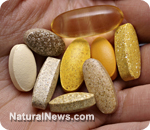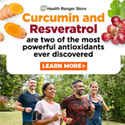
Calcium and vitamin supplements reduce breast cancer risk
Monday, October 04, 2010 by: David Gutierrez, staff writer
Tags: vitamins, breast cancer, health news
- Newly released JFK files reveal Pentagon's role in creating Lyme disease and covid in the same lab
- Dr. Suzanne Humphries makes bombshell appearance on Joe Rogan podcast, exposing vaccine industry deception back to POLIOMYELITIS
- L.A.'s rebuilding nightmare: Only 4 permits issued after fire destroys 6,000 homes
- Discovery of vast underground city beneath Giza pyramids challenges human history
- Black cumin seed oil emerges as a powerful ally against breast cancer and chronic inflammation
- “Independent” anti-Russia outlet MEDUZA faces COLLAPSE as US funding dries up
- Catastrophic 7.7 earthquake devastates Myanmar and Thailand; death toll could reach 100,000
- The hidden battle in your glass: How A1 and A2 milk could shape your health
- AI breakthrough slashes celiac disease diagnosis time from months to minutes
- BPA: The hidden hormone disruptor sabotaging your health - and how to fight back
- Sugar-free deception: Artificial sweeteners hijack hunger signals, fuel obesity epidemic, study warns
- Europe braces for WAR as EU urges citizens to STOCKPILE FOOD, in latest provocations with Russia
- Putin vows to 'finish off' Ukraine, accuses West of prolonging the war
- Thomas Massie’s Dual Loyalty Disclosure Act aims to restore American sovereignty by cracking down on foreign influence in Congress
- Aluminum pollution: A silent threat to human health
- Tesla owners under siege: Road rage, vandalism and political backlash fuel fear among drivers nationwide
- Chaos in Amsterdam: Five injured in broad daylight knife attack near Dam Square
- "Feel G.O.O.D. Gut Health Program" on BrightU: Dr. Basima Williams introduces the Feel-Good Plate Method
- Newly released JFK files reveal Pentagon's role in creating Lyme disease and covid in the same lab
- Analysis: The coming economic collapse, a mass uprising and Trump's three secret weapons to halt the growing revolt
- Festive flavors: The sweet history, nutritional profile and health benefits of pecan pie
- Elon Musk: Aliens could be here on Earth RIGHT NOW
- Trump reverses course on Gaza plan, says “nobody is expelling Palestinians”
- Big Pharma's $8 Billion bribery scheme exposed: how doctors are pushed to prescribe junk science, not heal
- Boys are back in town: Trump’s patriotic alpha crew takes the wheel while toxic females ride in the backseat
- Reclaim your health: How midlife exercise reverses years of inactivity
- A lack of integrity in Academia: Harvard professor found GUILTY of fraudulent research to promote CRT theory
- Survival 101: Effective EMF blocking techniques
- EPA advisor admits the agency is funneling billions to climate groups ahead of Trump’s return to White House
- Dr. Mike Yeadon releases 15-minute testimony - WATCH - about genocidal intent of COVID “vaccines”
- 5 Simple steps to boost your brainpower: How to strengthen executive function in a distracted world
- Florida takes a stand: DeSantis proposes permanent ban on mRNA vaccine mandates
- Sugarcane extract superior to cholesterol-lowering drugs?
- Mike Adams Sermon 66: God will DESTROY ISRAEL for its wickedness
- Pilots report mysterious lights 'moving at extreme speeds' across Oregon skies
- Space war brewing? Russia threatens to destroy Starlink satellites
- EPA advisor admits the agency is funneling billions to climate groups ahead of Trump’s return to White House
- California's social media censorship law struck down: A victory for free speech or a threat to online safety?
- The Health Ranger releases “Vaccine Zombie” song and music video, using AI-animated zombies for the music video
- Dr. Mike Yeadon releases 15-minute testimony - WATCH - about genocidal intent of COVID “vaccines”
- The pandemic as a tool for INDOCTRINATION: Understanding “The Indoctrinated Brain” by Dr. Michael Nehls
- Newly released JFK files reveal Pentagon's role in creating Lyme disease and covid in the same lab
- Florida takes a stand: DeSantis proposes permanent ban on mRNA vaccine mandates
- Mike Adams releases country western hit single: Goin’ Back in Time is Comin’ Home
- Mike Adams releases music poetry sensation: A Child of God
- “Why we influenced the 2020 elections”: Facebook files reveal the coordinated effort to bury the Hunter Biden laptop story
- Unpacking the Lies That We’ve Been Fed – new song and music video released by Mike Adams, the Health Ranger
- RFK Jr. clears key hurdle: Sen. Susan Collins backs controversial HHS nominee, signaling a new era for health policy
- Mike Adams releases new song and music video: Nothing More Disgusting Than a Globalist
- Michigan sheriff announces criminal investigation into 2020 election crimes, Dominion Voting Systems
- Israeli soldiers accused of even more torture and abuse in the West Bank
- Migrants are taking advantage of recent hurricanes to scam residents and loot their homes
- House Intelligence Committee calls for the ARREST and PROSECUTION of Dr. Anthony Fauci
- Rep. Nancy Mace introduces bill to ban biological males from female facilities on federal property
- Red Cross issues warning to stop blood plasma donations from vaccinated people
- Scientists confirm: GENIUS brain function can be spontaneously unleashed in humans without any apparent cause
- EPA advisor admits the agency is funneling billions to climate groups ahead of Trump’s return to White House
- HYSSOP: What research reveals about the health benefits of this ancient holy herb
- Two containers with completed ballots fall out of truck in Florida
- Fully vaccinated about to see “tsunami” of illness and death, warns virologist
- Global leaders unite to clamp down on “misinformation” with UN-backed Cascais Declaration
- BREAKING: 2025 NDAA authorizes mandatory military draft of WOMEN across America… as Pentagon pursues global NUCLEAR war with both Russia and China at the same time
- Michael Yon warns of a ZIONIST TAKEOVER in Trump’s second administration
- BOMBSHELL: DNA testing kits are a SCAM to develop ethnic-specific bioweapons
- Ozempic and Wegovy weight loss drugs are injectable LIZARD VENOM PEPTIDES that may unleash a devastating wave of organ failure… side effects align with symptoms of SNAKE BITES
- Israeli soldiers accused of even more torture and abuse in the West Bank
- These 13 countries just signed an agreement to engineer a global FAMINE by destroying food supply
- NASA admits that climate change occurs because of changes in Earth’s solar orbit, and NOT because of SUVs and fossil fuels
- RFK Jr. clears key hurdle: Sen. Susan Collins backs controversial HHS nominee, signaling a new era for health policy
- Sermon 30: How Jesus reveals Caesar’s FAKE CURRENCY and FALSE AUTHORITY
- Coriander seeds: Ancient medicine backed by modern science
- Arizona officials claim Maricopa County needs 10-13 days to tabulate results of the election
"It is not an immediate effect. You don't take a vitamin today and your breast cancer risk is reduced tomorrow," researcher Jaime Matta said. "However, we did see a long-term effect in terms of breast cancer reduction."
The researchers conducted the study on 457 healthy women and 268 with breast cancer, all of whom had been taking vitamin and mineral supplements for the past five years. The women filled out a questionnaire about which vitamins and minerals they were taking, how regularly they took them, and if they were still taking them.
They then took samples of each woman's blood and measured her DNA's ability to repair itself of damage.
"This process involves at least five separate pathways and is critical for maintaining genomic stability," Matta said. "When the DNA is not repaired, it leads to mutation that leads to cancer."
The researchers found that calcium supplements significantly increased a woman's DNA repair capacity. Taking calcium supplements also decreased a woman's risk of breast cancer by 40 percent, while vitamin supplements decreased it by 40 percent.
Women who had a low DNA repair capacity, a family history of breast cancer, and no history of breast feeding were all more likely to suffer from breast cancer. When the researchers adjusted for calcium's effect on DNA repair capacity, they found little remaining effect on breast cancer risk.
This suggests that calcium helps prevent cancers by boosting DNA's ability to regenerate from damage. The mechanisms by which vitamin supplements protect the body from cancer were not determined.
"The importance of the study is that it's addressing normal doses, the recommended amount of vitamins, not high-dose supplements," said Victoria Seewaldt of Duke University.
Sources for this story include: http://www.eurekalert.org/pub_releases/2010-... http://www.themedguru.com/20100421/newsfeatu....
Vitamins at FETCH.news
Get independent news alerts on natural cures, food lab tests, cannabis medicine, science, robotics, drones, privacy and more.
Take Action: Support Natural News by linking to this article from your website
Permalink to this article:
Embed article link: (copy HTML code below):
Reprinting this article:
Non-commercial use OK, cite NaturalNews.com with clickable link.
Follow Natural News on Facebook, Twitter, Google Plus, and Pinterest
Science News & Studies
Medicine News and Information
Food News & Studies
Health News & Studies
Herbs News & Information
Pollution News & Studies
Cancer News & Studies
Climate News & Studies
Survival News & Information
Gear News & Information
News covering technology, stocks, hackers, and more



"Big Tech and mainstream media are constantly trying to silence the independent voices that dare to bring you the truth about toxic food ingredients, dangerous medications and the failed, fraudulent science of the profit-driven medical establishment.
Email is one of the best ways to make sure you stay informed, without the censorship of the tech giants (Google, Apple, Facebook, Twitter, YouTube, etc.). Stay informed and you'll even likely learn information that may help save your own life."
–The Health Ranger, Mike Adams













































